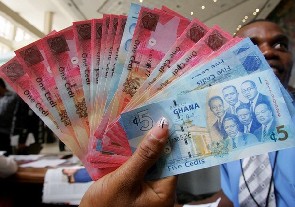The cedi is expected to continue to wobble in the first quarter of the year as demand pressure increases, although analysts believe the instability will be short-lived.
From November to now, the cedi has depreciated by over 10percent, and has already done a year-to-date depreciation of 1.8percent against the US dollar, largely due to low commodity prices and low foreign exchange earnings, whereas the whole of the first quarter of 2016 saw a depreciation of 1percent.
But in a renewed effort to stabilise the cedi, the Bank of Ghana recently auctioned US$69million into the market.
According to RMB Global Research, the market intelligence arm of South African bank, FirstRand Bank, the recent auction “could keep demand at bay but without stronger FX inflows the currency could come under pressure again in the short term.”
But in the wake of the announcement by the new government of US$1.6billion of previously undisclosed spending, the cedi, unsurprisingly, has taken a knock. In the interbank market, the USD/GHS reached a high point of GH¢4.37, before recovering some of its losses.
“We expect weakening pressure to continue this week, although the BoG could intervene to tame the rate of depreciation,” RMB Global Research added.
Peter Nii Odoi Charway, Head of Research & Strategy at Ideal Capital Partners, said the BoG’s move is not sustainable, noting that the economy needs to earn more US Dollars through more local production and value added exports.
“We need to explore alternative opportunities for local production and export to earn more US dollars,” he added.
Jeffery Baiden, Chief Operating Officer at Nimed Capital, an investment bank, noted that the major factors that have accounted for the performance of the cedi, since the beginning of year, include the rise of the US Fed funds rate to 0.75percent, coupled with a gradual treasury yield decline.
“These factors have collectively triggered portfolio flows into less risky US debt instruments from our domestic market,” he added.
Mr. Baiden explained that the currency will see some short-term pressure as companies and businesses restock their inventory.
However, the central bank’s decision to pump into the market additional forex, amid expected increase in government’s receipts from increased oil production, will collectively ensure a reasonable trading range for the cedi.
He believes that in alleviating the pressure on the currency, the central bank can increase the amount of forex it anticipates to auction in the short-term.
But Kisseih Antonio, Managing Director of Ecobank Capital, opined that nothing the BoG will do can help stabilise the cedi if government is not prudent in helping deal with the current account imbalances which fuel the demand for forex.
“The BoG cannot wave a magic wand to stabilise the currency when the problem we have is a structural one, not a monetary one. We all seem to point fingers at the BoG when the cedi is not doing well but the government, and not the BoG, is in charge of fiscal policy and matters. The BOG can only help in the short-term by intervening in the FX market to mitigate any depreciation,” he said.
He noted that ongoing weak growth in Ghana’s key export markets of South Africa, the EU and China will continue to undermine export prospects, which could adversely impact the performance of the local currency.









